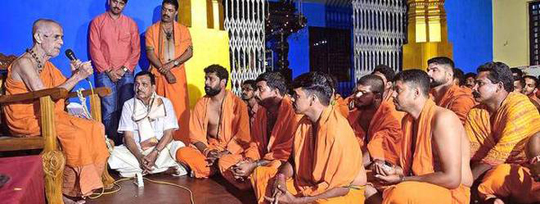Washington D.C., May 8: The prime time for brain development in a child's life is the first year, where the infant spends most of the time asleep. It is the time when neural connections form and sensory memories are encoded.
However, when sleep is disrupted, as occurs more often among children with autism, brain development may be affected, too.
New research led by the University of Washington finds that sleep problems in a baby's first 12 months may not only precede an autism diagnosis but also may be associated with altered growth trajectory in a key part of the brain, the hippocampus.
The study, which was published in the American Journal of Psychiatry, researchers report that in a sample of more than 400 taken of 6- to 12-month-old infants, those who were later diagnosed with autism were more likely to have had difficulty falling asleep.
It also states that this sleep difficulty was associated with altered growth trajectories in the hippocampus.
"The hippocampus is critical for learning and memory, and changes in the size of the hippocampus have been associated with poor sleep in adults and older children.
As many as 80 per cent of the children with autism spectrum disorder have sleep problems," said Annette Estes, director of the UW Autism Center and senior author of the study.
"In our clinical experience, parents have a lot of concerns about their children's sleep, and in our work on early autism intervention, we observed that sleep problems were holding children and families back," added Estes, who is also a UW professor of speech and hearing sciences.
"It could be that altered sleep is part-and-parcel of autism for some children. One clue is that behavioural interventions to improve sleep don't work for all children with autism, even when their parents are doing everything just right. This suggests that there may be a biological component to sleep problems for some children with autism," said Estes.
To consider links among sleep, brain development, and autism, researchers at the IBIS Network looked at MRI scans of 432 infants, surveyed parents about sleep patterns, and measured cognitive functioning using a standardized assessment.
At the outset of the study, infants were classified according to their risk for developing autism: Those who were at higher risk of developing autism -- about two-thirds of the study sample -- had an older sibling who had already been diagnosed.
Infant siblings of children with autism have a 20 per cent chance of developing autism spectrum disorder -- a much higher risk than children in the general population.
In the current study, 127 of the 432 infants were identified as "low risk" at the time the MRI scans were taken because they had no family history of autism.
They later evaluated all the participants at 24 months of age to determine whether they had developed autism. Of the roughly 300 children originally considered "high familial risk," 71 were diagnosed with autism spectrum disorder at that age.
Problems with sleep were more common among the infants later diagnosed with an autism spectrum disorder, as were larger hippocampi. No other subcortical brain structures were affected, including the amygdala, which is responsible for certain emotions and aspects of memory, or the thalamus, a signal transmitter from the spinal cord to the cerebral cortex.
The authors note that while parents reported more sleep difficulties among infants who developed autism compared to those who did not, the differences were very subtle and only observed when looking at group averages across hundreds of infants.
Sleep patterns in the first years of life change rapidly as infants transition from sleeping around the clock to a more adult-like sleep/wake cycle. Until further research is completed, Estes said, it is not possible to interpret challenges with sleep as an early sign of increased risk for autism.






Comments
Peja,
Please explain to your followers that NA TASYA PRATIMA ASTI means there is no image of GOD and U guys are fooled to worship lifeless stones and objects just to be a part of fire...
God says there is only one God and U should worship this one God... and not associate partners with him...
Look for the TRUE GOD , If U are honest U will find him otherwise people like peja will deceive U in your whole life to worship the lifeless objects which will not benefit nor harm anybody.
33 crores plus one
Datta Peetha for Hindus, Kanakana Kindi at Sri Krishna Matta for Harijans. Are you ready Swamiji?????
99% of Hindus are not behind and interested in Ram temple and datta peeta but Bajrangies.....this terrorist groups should be given a lesson by the government.....
Shri Dattatreya was both god and guru for Hindus.
I do not understand the above sentence. Its looks funny while reading because how people accept every creations of god as GOD???
Worship the creator and not his creations.
What is dutta peeta? what about ram temple...is it closed chapter?
Bajrangies should understand that the both places are Muslims property...cannot take a centimeter from it....
It proved that he is the swamy for goons and criminals.
Hey cheater pejawara...
This land doesnot belong to your father, mind it and mind your own business....
Wonderful argument by Great Swamiji, any way, definitely that \DATTA PEETA\" belongs to Hindustanis, but not Criminal Goonda Looters, Swamiji looking and Listening you are Thinking These before Chaddi Now Lungi Cheating Looting for Gangasara, leave their Gangasara business to Master Charan. swamiji see all belongs to Hindustanis why are you simply listening some criminal goonds says for their benefit nothing else you great swamiji these goonda political looters are doing good for our great Nation!!!!!!!!! never and ever swamiji all are Self contribution only not for religion not for nation.
Hindustan Jindabad.."
Add new comment